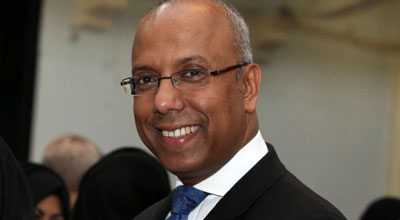Mohammed bin Salman and the battle of London
 Abdulrahman Al-Rashed: The attempts of some Qataris, Iranians and their followers and leftist remnants have failed to foil the first visit of Prince Mohammed bin Salman as a crown prince to the UK, and denigrate his political and social plans.
Abdulrahman Al-Rashed: The attempts of some Qataris, Iranians and their followers and leftist remnants have failed to foil the first visit of Prince Mohammed bin Salman as a crown prince to the UK, and denigrate his political and social plans.
Most of the politicians and journalists with an interest in Middle Eastern affairs have expressed admiration for his personality and plans.
First off the mark was British Foreign Secretary Boris Johnson, who praised “the reformist” crown prince in an Op-Ed in “The Times” newspaper, declaring that not just the UK, but the whole world should support the crown prince, whose plans are in all parties’ interests.
What can Sheikh Tamim, and his father — the real governor of Qatar — do besides attempting to save their French football team, Paris Saint-Germain, or tarnish the image of the Saudi guest?
The alternative program of Doha is to promote the Muslim Brotherhood and Hezbollah and other factions which have ruined the region since the radical Islamists took over the government in Iran in 1979.
The UK, usually reserved in taking decisive positions, was this time quite swift in its positive response to the crown prince. Most newspapers and political programs on TV were authentically positive, and most comments of the MPs and government officials at all levels supported Saudi Arabia.
The British government explicitly stated its support to the Kingdom’s stance over Yemen, despite protests by some organizations and pro-Qatar and Iran groups.
Moreover, the British government supported Riyadh against the government in Iran and its dangerous activities in the region. A week before the visit, the UK led the consultations at the UN Security Council, aiming at blaming Iran for its military support to the Houthi militia in Yemen, a motion aborted only by a veto from Russia.
The importance of the visit of the crown prince is that it comes in the context of seeking support to the stance of Saudi Arabia and the coalition countries, in the face of relentless attempts to turn the Europeans — particularly the British — against it.
The war in Yemen has been reduced to humanitarian issues, rather than looking for the real source of the crisis and the suffering and the root cause of the problem, which is the coup against the legitimate government; the same government instituted by the decisions of the UN Security Council sponsoring a political solution in Yemen. The UK, however, has responded by acknowledging the real source of the crisis, i.e. the coup whose leadership is holding Yemen hostage.
Crown Prince Mohammed bin Salman recognizes the importance of the Yemeni issue, and he is right to support the legitimate government and the Yemeni people, because the collapse of Yemen will have a ripple effect and lead to the collapse of the rest of the region and the prevalence of violence and chaos.
The goal is to destroy the “statelet” of Ansarallah-Houthi militia, and thus prevent a terrorist group from reigning over Yemen by force, which will no doubt spread and increase violence in the region.
Throughout the three-day “state visit,” opponents attempted to turn the British capital into a confrontation arena and a challenge to the guest — but they did not succeed. They even tried and failed to take the issue of the war in Yemen to the streets of London after the British government refused to respond to them.
Most of the debates and reactions, in fact, focused on discussing the crown prince’s plans related to openness, empowering women and youth, combating extremism — including Iran’s threat — and reforming the economy in the framework of the new Saudi vision.
The visit has reaffirmed the role of Riyadh as an important regional center and a leader of positive change. The world wants to see rapid progress toward moderation, tolerance, coexistence and putting an end to extremism. Riyadh definitely has an important role to play, and it has just started.
— Abdulrahman Al-Rashed is a veteran columnist. He is the former general manager of Al-Arabiya news channel, and former editor-in-chief of Asharq Al-Awsat.
Twitter: @aalrashed





